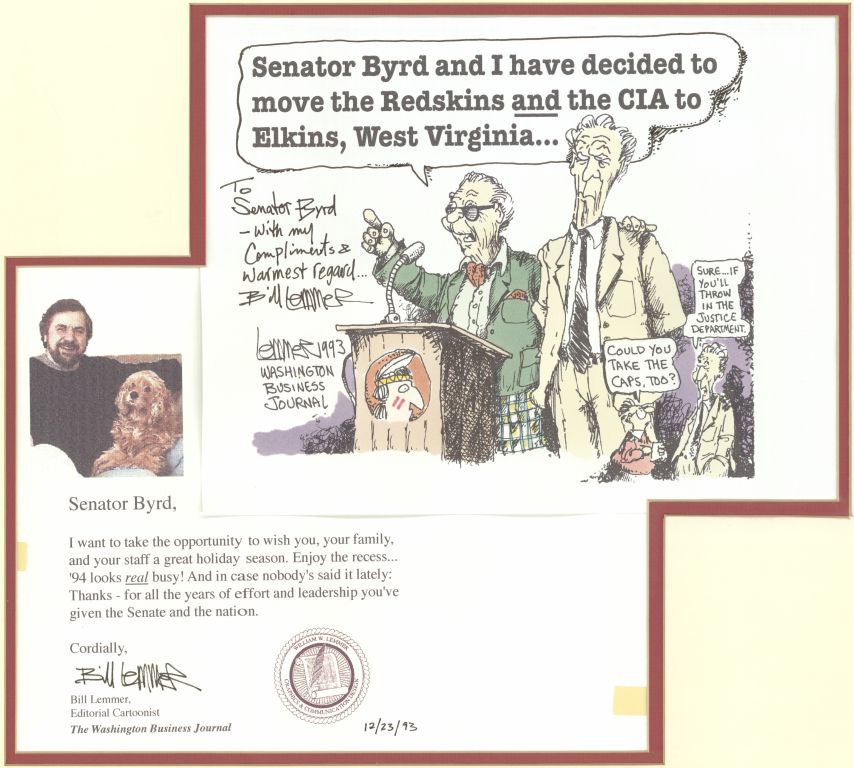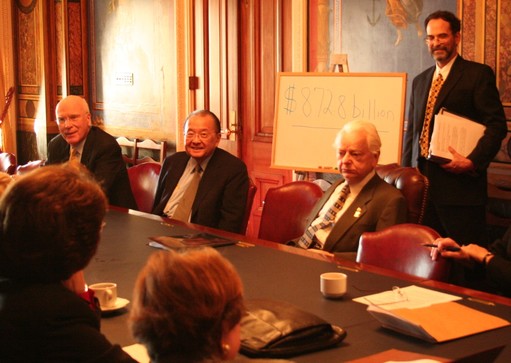|
Note: This post was previously listed under our "News from the Grey Box" blog series
The cartoon depicts Jack Kent Cooke, late owner of the Washington Redskins, explaining that he and Senator Robert C. Byrd had decided to move the team and the CIA to Elkins, West Virginia. A reporter is shown asking Byrd if he is willing to take the Capitals, Washington D.C.’s professional hockey team, as well. Byrd says that he is willing, but only on the condition that the Justice Department is thrown in as a part of the deal. It is easy to laugh at such an image, but the reason Lemmer’s cartoon succeeds as a satire is because it is not terribly far from the truth. In 1989, Byrd was appointed Chairman of the Senate Appropriations Committee. As appropriations chair, the Senator continued working to fulfill his 1959 promise to “put West Virginia on the map.” Byrd’s well-known projects included promoting tourism, improving infrastructure, and transferring 7,000 federal jobs from Washington, D.C. to West Virginia, which is primarily what the cartoon is referencing. In addition to securing several United States Coast Guard facility relocations to West Virginia, Byrd also urged the Federal Bureau of Prisons to open a prison near Beckley that created more than 250 jobs. $73 million in funding was approved by the Senate Appropriations Subcommittee on Transportation in 1989 alone for Byrd’s Appalachian highway project that was responsible for road construction through Mingo and Randolph Counties. He also obtained over $50 million for the development of the New River Gorge National River facilities which would promote tourism in the southern part of the state. All in all, between 1989 and 1994, shortly after this cartoon was drawn, Byrd brought over $3.2 billion in federal funds for projects into West Virginia. In the process of securing funding for projects such as these, Byrd received criticism from other politicians and the press. Although the Senator stressed that his constituents were not the only people benefitting from federal projects in West Virginia, he still earned the nickname “King of Pork” from Washington journalists and critics in other political circles. Lemmer’s cartoon is less of a negative caricature than what might be expected from political cartoons, given the frequent criticisms of Byrd and his projects. The caption does not pass judgment on Senator Byrd but instead brings to light the nature of his work in appropriating funds for his state in a lighthearted and amusing manner. The complimentary note that appears next to the cartoon in the image, which Lemmer sent to Senator Byrd along with the cartoon, reveals the appreciation that the cartoonist had for the senator and his work, and points to a less antagonistic relationship between author and subject than what is commonly assumed. As to the criticism and less flattering press aimed at Byrd and the improvements he sought to make in West Virginia, the Senator did not appear to let it bother him. “I have no apologies to make for serving my people,” Byrd said. “As long as I am here, I am going to remember the people who sent me here.” Sources:
Byrd, Robert C. Robert C. Byrd: Child of the Appalachian Coalfields. Morgantown: West Virginia University Press, 2005, 594. Corbin, David A. The Last Great Senator. Robert C. Byrd’s Encounters with Eleven U.S. Presidents. Potomac Books, Washington, DC, 2012, 55, 228-229, 231-234, 237. Comments are closed.
|
Welcome to the Byrd Center Blog! We share content here including research from our archival collections, articles from our director, and information on upcoming events.
Categories
All
Archives
July 2023
|
Our Mission: |
The Byrd Center advances representative democracy by promoting a better understanding of the United States Congress and the Constitution through programs and research that engage citizens.
|
Copyright © Robert C. Byrd Center for Congressional History and Education
|



 RSS Feed
RSS Feed
